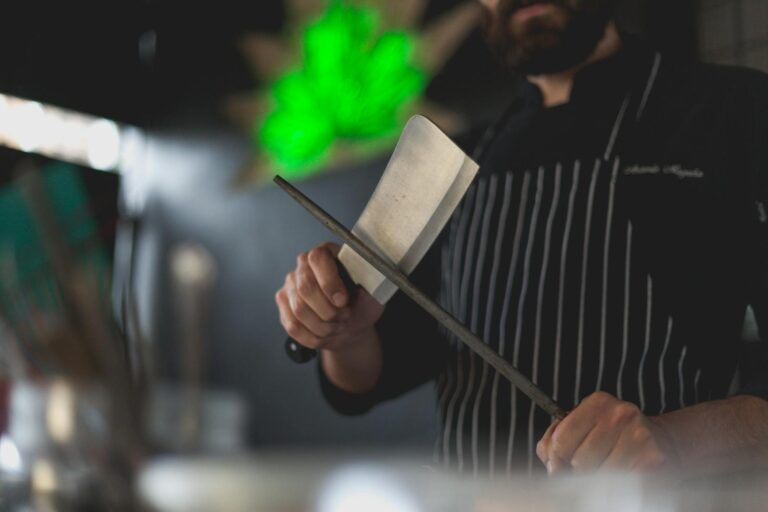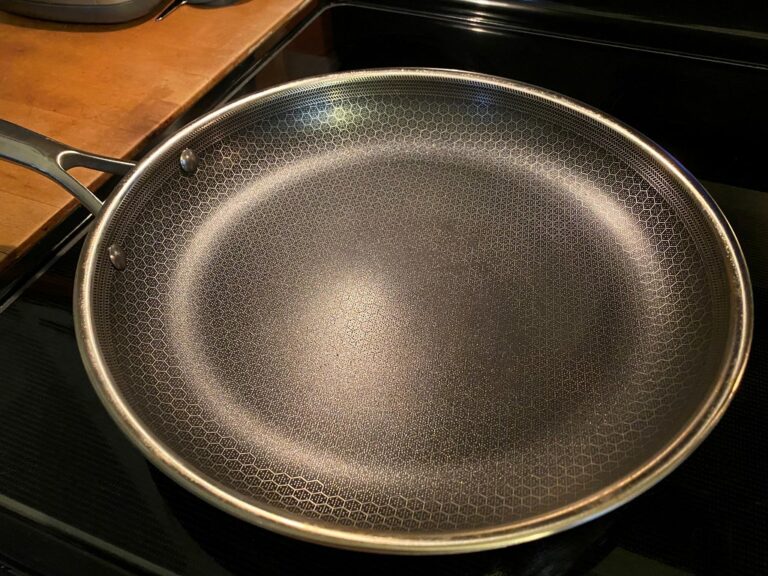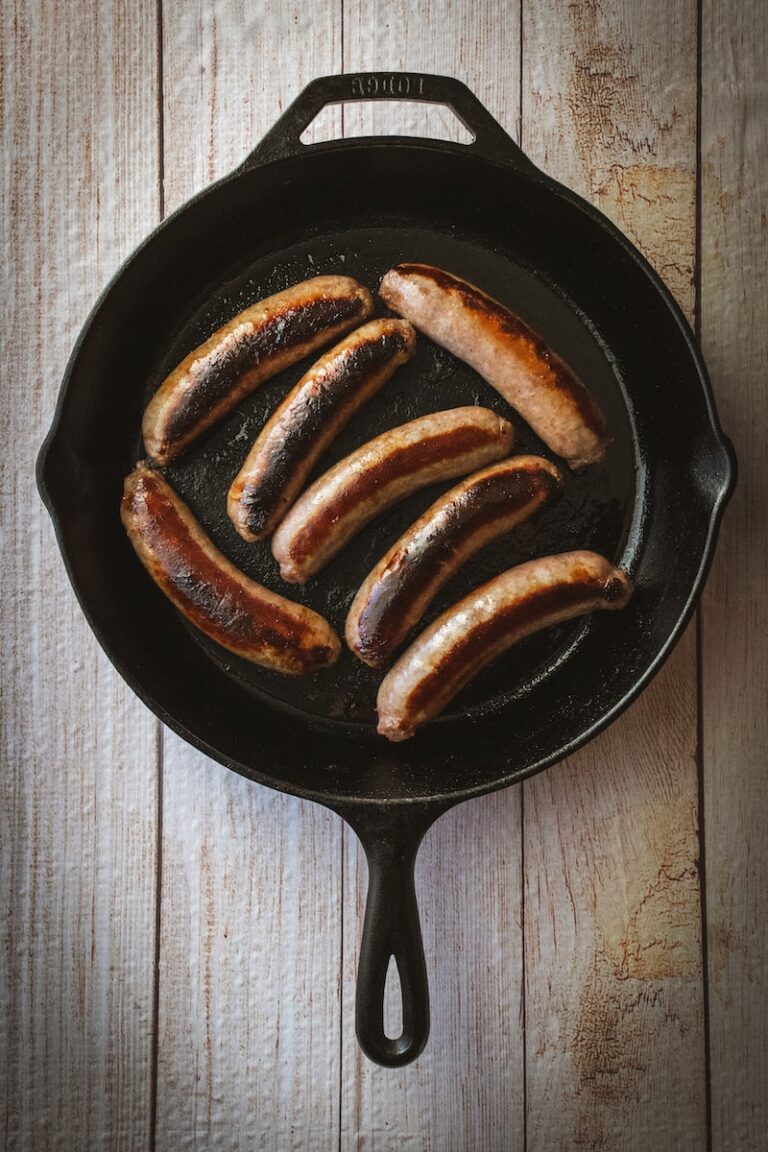I’ve always loved cooking with cast iron pans, but I’ve had my fair share of battles with rust. So, when it comes to the question ‘Can cast iron pans rust?’ I can confidently say yes.
In this article, I’ll delve into the factors that contribute to rusting in cast iron pans and provide tips on how to properly season and maintain them.
Join me as we debunk some myths and learn effective techniques for removing and preventing rust in our beloved cast iron pans.
Key Takeaways
- Cast iron pans can rust due to moisture and oxidation.
- Proper seasoning helps create a protective layer on the surface, preventing rust formation.
- Regular maintenance, including proper cleaning, drying, and storage, is essential to prevent rust.
- Avoid using harsh detergents or abrasive scrubbers and dry the pan immediately after cleaning to prevent rust.
Understanding the Composition of Cast Iron Pans
To understand the composition of cast iron pans, you should know that they are made primarily of iron and carbon. Cast iron is an alloy that contains around 2-3% carbon and 94-98% iron. The high carbon content gives cast iron its unique properties, such as excellent heat retention and even heat distribution.
This makes it ideal for cooking in a variety of ways, from searing steaks to baking cornbread. The iron used in cast iron pans is typically derived from scrap metal or pig iron, which is melted down and poured into molds to form the shape of the pan.
Once cooled and solidified, the pan undergoes a seasoning process to create a non-stick surface and protect it from rusting.
Factors That Contribute to Rusting in Cast Iron Pans
When it comes to rusting in cast iron pans, two key factors contribute to this issue: moisture and oxidation.
Moisture can seep into the pan through improper cleaning or storage, leading to the formation of rust.
Additionally, oxidation occurs when the protective layer on the cast iron surface is compromised, exposing it to air and causing it to rust.
Another factor that plays a role in rusting is the lack of proper seasoning. Seasoning helps create a natural barrier against moisture and prevents oxidation.
Moisture and Oxidation
You should be careful because moisture and oxidation can cause rust to form on your cast iron pans. As a proud owner of several cast iron pans, I have learned this the hard way.
It is essential to keep your cast iron pans dry after each use to prevent moisture from sitting on the surface and triggering the rusting process. Simply wiping them with a cloth or paper towel should suffice.
Additionally, oxidation can occur when the pans are exposed to air for extended periods without any protective coating, such as oil or seasoning. To combat this, make sure to season your cast iron pans regularly by applying a thin layer of oil and heating them in the oven.
These simple steps will help preserve the integrity of your cherished cookware for years to come.
Lack of Proper Seasoning
Proper seasoning is crucial for maintaining the quality of your beloved cast iron cookware. Without it, your pan can easily lose its non-stick properties and become prone to rusting.
Here are three reasons why proper seasoning is so important:
- Protection against moisture: Seasoning creates a protective layer on the surface of the pan, preventing moisture from coming into direct contact with the iron. This helps to prevent rust formation.
- Enhanced flavor: A well-seasoned cast iron pan develops a natural non-stick coating that enhances the flavor of your food. The oils used in seasoning act as a barrier between the food and the metal, allowing for better cooking and browning.
- Longevity: Regularly seasoning your cast iron pan helps to extend its lifespan. By preventing rust and maintaining a smooth cooking surface, you can enjoy your trusty cast iron companion for years to come.
How to Properly Season a Cast Iron Pan
To properly season a cast iron pan, it’s important to start with a clean and dry surface. I begin by washing my pan with hot water and mild dish soap, making sure to scrub off any food residue. Once the pan is clean, I pat it dry thoroughly using a kitchen towel.
Next, I preheat my oven to 400°F (200°C). While the oven is heating up, I take a small amount of vegetable oil and rub it all over the pan, including the handle. I make sure to coat every inch of the surface evenly.
Then, I place the pan upside down on the middle rack of the oven and let it bake for one hour. After that, I turn off the heat and allow the pan to cool completely before using or storing it.
This process helps create a protective layer that prevents rusting and provides a non-stick coating for cooking.
The Importance of Regular Maintenance for Cast Iron Pans
Regular maintenance is essential for keeping your cast iron pan in good condition and ensuring its longevity. Here are three reasons why regular maintenance is important:
- Prevents rust: One of the biggest risks to a cast iron pan is rust. By regularly cleaning and drying it properly, you can prevent moisture from causing rust to develop on the surface.
- Maintains seasoning: Seasoning is what gives a cast iron pan its non-stick properties and enhances its flavor. Regular maintenance helps maintain the seasoning by removing any food residue or excess oil that may affect its quality.
- Preserves heat retention: Cast iron pans are known for their excellent heat retention capabilities. However, if not properly maintained, they can lose their ability to distribute and retain heat evenly. Regular maintenance ensures that the pan remains in optimal condition, allowing it to perform at its best every time.
Common Mistakes That Lead to Rusting in Cast Iron Pans
One of the most common mistakes that can lead to rusting in your cast iron pan is not properly drying it after cleaning. Moisture left on the surface of the pan can cause oxidation and ultimately result in rust formation. To avoid this, I always make sure to thoroughly dry my cast iron pan after every use. I wipe it down with a clean towel and then place it on low heat for a few minutes to ensure all moisture evaporates. Additionally, it’s important to season your cast iron pan regularly to create a protective layer that helps prevent rusting. By taking these simple steps, you can keep your cast iron pan in great condition for years to come.
| Common Mistakes That Lead to Rusting | Prevention Tips |
|---|---|
| Not properly drying after cleaning | Thoroughly dry with towel & low heat |
| Storing pans while still damp | Ensure pans are completely dry before storing |
| Neglecting regular seasoning | Season cast iron regularly for added protection |
Removing Rust From Cast Iron Pans: Effective Techniques
Using vinegar and a scrub brush is an effective technique for removing rust from your cast iron pan. I’ve personally tried this method, and it works wonders!
Here are three reasons why you should give it a try too:
- Efficiency: Vinegar is known for its acidic properties, which help dissolve rust. When combined with a scrub brush, it becomes a powerful duo that can tackle even the toughest rust stains on your cast iron pan.
- Eco-friendly: Instead of resorting to harsh chemicals or abrasive cleaners, using vinegar is a natural and environmentally friendly option. It’s safe to use around food and won’t harm the seasoning of your cast iron pan.
- Cost-effective: Vinegar is readily available in most households, making it an affordable solution for rust removal. You don’t need to spend extra money on expensive cleaners when you have this simple yet effective method at your disposal.
Preventing Rust in Cast Iron Pans: Best Practices
To keep your cast iron pan in pristine condition, it’s important to follow these best practices for preventing rust.
Firstly, always make sure to thoroughly dry your cast iron pan after each use. Moisture is the number one enemy of cast iron and can quickly lead to rust formation.
Secondly, avoid using harsh detergents or scrub brushes that can strip away the seasoning on your pan, as this protective layer helps prevent rust from forming. Instead, opt for a gentle scrub with hot water and a soft brush or sponge.
Lastly, store your cast iron pan in a dry place with good airflow. Avoid stacking pans on top of each other as this can trap moisture and promote rust growth.
Debunking Myths About Cast Iron Pans and Rust
Contrary to popular belief, cast iron pans can be easily maintained and are not prone to rust. I have been using cast iron pans for years, and I can confidently say that rust is not a major issue if you take proper care of them.
Here are three important things to remember when it comes to cast iron pans and rust:
- Seasoning: The key to preventing rust in cast iron pans is proper seasoning. This involves coating the pan with oil or fat and baking it at high heat. Seasoning creates a protective layer on the surface, preventing moisture from coming into contact with the iron.
- Drying: After washing your cast iron pan, make sure to dry it thoroughly before storing it. Moisture left on the surface can lead to rust formation over time.
- Regular use: Using your cast iron pan regularly helps maintain its seasoning and prevents moisture from settling on the surface. So don’t be afraid to cook up some delicious meals in your trusty cast iron pan!
Conclusion
In conclusion, cast iron pans can rust if not properly cared for. Understanding the composition of cast iron and taking steps to season and maintain the pan is crucial in preventing rust.
Regular maintenance and avoiding common mistakes can help extend the lifespan of your cast iron pan. If rust does occur, there are effective techniques for removing it.
By following best practices and debunking myths, you can enjoy the benefits of cooking with a well-maintained cast iron pan for years to come.



